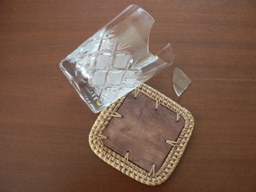God’s Grace in Small Things
or
Lessons from a Broken Crystal Glass

It happened so suddenly – the swiftness of it all. I was at the kitchen
counter pouring water into the kettle which stood too close to two crystal glasses left to dry. Wiping a small
spill of water, my hand accidentally knocked over one of the crystal glasses. It broke.
My heart sank in disbelief. The finality of it all. Only yesterday I had enjoyed a
homemade Kombucha drink from that Bohemian crystal glass. It was a gift from a dear elderly lady connected with
my wife’s now deceased relatives in Heřmanův Mĕstec whom we had visited over 20 years ago. The glass had
survived being transported around the world. Now, in a moment, it was gone.
Three realities of life quickly reinforced themselves in my mind –
its impermanence, suffering,
and the need for less attachment to our material
possessions.
For a while I mourned the loss of that Bohemian crystal glass. Firstly,
the denial. Momentarily, I couldn’t believe that the
glass was broken – never again would a drink be enjoyed from it. Secondly, the anger. Why
was I so careless? Couldn’t I have been more mindful? Why did I have to wipe that little spill of water anyway?
Thirdly, and predictably, the bargaining. Could the broken piece somehow be glued
back into place? Gingerly I picked up the sharp piece of glass and tried inserting it into its original place.
But, how could the piece ever be imperceptibly glued back in? Impossible! Finally, a
momentary depressed
feeling came over me. The hopelessness of it all – the glass was
broken for good.
In looking back, I realized that I had lived through the stages of grieving. This was
indeed a process that I had to work through by myself – no one could come alongside to either deny the feelings
or accelerate movement through the stages. Mourning a loss is always necessary to release the pain.
Unexpectedly, however, another phenomenon can occur in grieving – and that is the reawakening of older and
unresolved feelings. David Viscott in his book, Emotional Resilience, writes that these companion feelings may appear as intensifiers of the loss, or as a bad
mood that seems to appear from nowhere.
I also noticed that these stages of my mourning all dealt with what had happened in
the past. I had to let go of the past. This is easier
said than done because of the feelings involved. But the past can never be changed or relived. Asking a lot
of “why” questions is fruitless.
In the end, I reached acceptance – accepting what I had caused to
happen. In doing so, my consciousness shifted from the past to the present. In place of “why” questions, I could
focus on “what” questions – what lessons could I learn from this experience, enabling me to live more mindfully
today? To further understand acceptance, again I turn to Viscott for the following insights.
The truest healing comes through acceptance of your pain and suffering
as it is happening. Acceptance means:
▪
Letting go, without denying the hurt.
▪
Embracing what has happened, even if you do not like it.
▪
Welcoming the truth, even if it hurts.
▪
Being on friendly terms with your pain.
▪
Being willing to admit failure, abandonment, loneliness, powerlessness, and hurting others – all
without giving up.
Acceptance is not easy, but it is your only hope for happiness and peace of
mind in the face of impossible odds and unthinkable losses. If you don’t accept the loss, you
are:
▪
Forced to harbor the pain.
▪
Bound to the past, and have mortgaged your future to
suffering.
Some
losses can lead one to look at life from a higher perspective. The Scriptures hold out these comforting
words: “No testing has overtaken you that is not common to everyone. God is faithful, and he will not let you
be tested beyond your strength, but with the testing he will also provide the way out so that you may be able
to endure it” (First Letter to the Corinthians). In the broken crystal glass incident, suddenly my wife
remembered our having one other crystal glass from overseas, which had rarely been used. In God’s providence,
my suffering over this small loss was made bearable.
© Text and photo: Alex Peck
Reference: David Viscott, Emotional Resilience: Simple
Truths for Dealing with the Unfinished Business of Your Past (New York: Three Rivers Press,
1996), 126-127.
| 

 Facebook
Facebook Twitter
Twitter Digg
Digg Stumbleupon
Stumbleupon